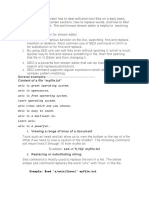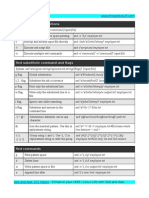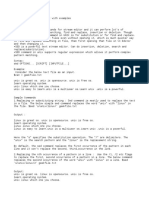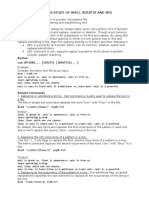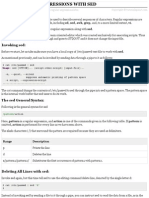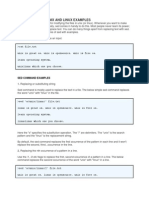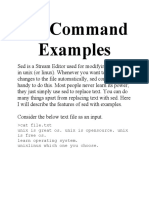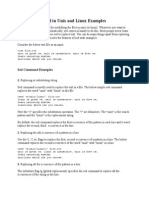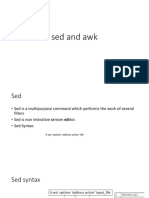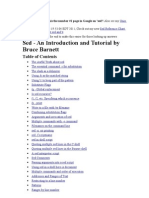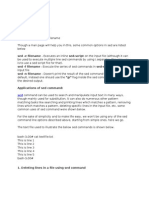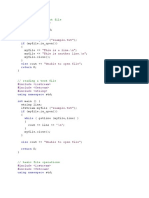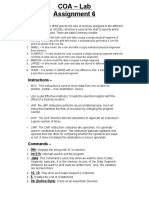SED Commands
SED
What is SED?
SED stands for Stream Editor. It is a powerful command-line tool used for parsing
and transforming text in a pipeline or script. Typically used on Unix-like operating
systems (such as Linux or macOS), SED allows you to perform tasks like:
1. Text substitution – replacing one string with another (e.g., replacing "apple"
with "orange").
2. Text deletion – removing lines or parts of lines.
3. Text insertion – adding new text or lines at specific locations.
4. Text transformation – using regular expressions to modify patterns.
SED Command Syntax
Basic SED Syntax:
sed [options] {sed-commands} {input-file}
For all sed examples, we'll be using the following employee.txt file.
$ vi employee.txt
101,John Doe,CEO
102,Jason Smith,IT Manager
103,Raj Reddy,Sysadmin
104,Anand Ram,Developer
105,Jane Miller,Sales Manager
The following example prints every line of employee.txt twice:
$ sed 'p' employee.txt
Print each line once (functionally the same as 'cat employee.txt'):
$ sed -n 'p' employee.txt
Print only the 2nd line:
$ sed -n '2 p' employee.txt
Print from line 1 through line 4:
$ sed -n '1,4 p' employee.txt
Print from line 2 through the last line ($ represents the last line):
$ sed -n '2,$ p' employee.txt
Print only odd numbered lines:
$ sed -n '1~2 p' employee.txt
Pattern Matching
Print lines matching the pattern “Jane”:
$ sed -n '/Jane/ p' employee.txt
Print lines starting from the 1st match of "Jason" until the 4th line:
$ sed -n '/Jason/,4 p' employee.txt
Print lines starting from the 1st match of "Raj" until the last line:
$ sed -n '/Raj/,$ p' employee.txt
Print lines starting from the line matching "Raj" until the line matching
"Jane":
$ sed -n '/Raj/,/Jane/ p' employee.txt
Print the line matching "Jason" and 3 lines immediately after that:
$ sed -n '/Jason/,+3 p' employee.txt
Deleting Lines
Delete only the 2nd line:
$ sed '2 d' employee.txt
Delete from line 1 through 4:
$ sed '1,4 d' employee.txt
Delete from line 2 through the last line:
$ sed '2,$ d' employee.txt
Delete only odd number of lines:
$ sed '1~2 d' employee.txt
Delete lines matching the pattern "Manager":
$ sed '/Manager/ d' employee.txt
Delete lines starting from the 1st match of "Jason" until the 4th line:
$ sed '/Jason/,4 d' employee.txt
Delete lines starting from the 1st match of "Raj" until the last line:
$ sed '/Raj/,$ d' employee.txt
Delete lines starting from the line matching "Raj" until the line matching "Jane":
$ sed '/Raj/,/Jane/ d' employee.txt
Delete all the empty lines from a file:
sed '/^$/ d' employee.txt
Delete all comment lines (assuming the comment starts with #):
sed '/^#/ d' employee.txt
SED Substitute Commands
Replace all occurrences of Manager with Director:
$ sed 's/Manager/Director/' employee.txt
Replace Manager with Director only on lines that contain the keyword 'Sales':
$ sed '/Sales/s/Manager/Director/' employee.txt
Replace the 1st occurrence of lower case a with upper case A:
$ sed 's/a/A/' employee.txt
Replace all occurrences of lower case a with upper case A:
$ sed 's/a/A/g' employee.txt
Replace the 2nd occurrence of lower case a to upper case A:
$ sed 's/a/A/2' employee.txt

